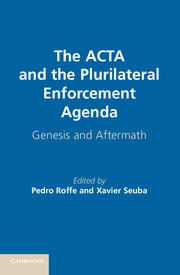Book contents
- Frontmatter
- Contents
- List of Contributors
- Foreword
- Acknowledgments
- Acronyms
- Introduction
- PART I THE FINAL ACT: ITS MAIN FEATURES AND CONTENTS
- PART II DOMESTIC LEGISLATIVE CHALLENGES
- PART III IMPACT ON RELATED PROCESSES
- PART IV VIEWS FROM STAKEHOLDERS: LESSONS
- PART V WHAT LIES AHEAD ACTA
- 21 Assessing the Implications of ACTA for the European Union
- 22 ACTA
- 23 What Was Left Out of ACTA
- 24 Slaying the ACTA Myths
- 25 Developing Countries and the Contestation of ACTA at the TRIPS Council
- 26 ACTA: What Lessons for Future Plurilateral Trade Agreements?
- Annex I Anti-Counterfeiting Trade Agreement
- References
- Index
- References
24 - Slaying the ACTA Myths
Published online by Cambridge University Press: 05 December 2014
- Frontmatter
- Contents
- List of Contributors
- Foreword
- Acknowledgments
- Acronyms
- Introduction
- PART I THE FINAL ACT: ITS MAIN FEATURES AND CONTENTS
- PART II DOMESTIC LEGISLATIVE CHALLENGES
- PART III IMPACT ON RELATED PROCESSES
- PART IV VIEWS FROM STAKEHOLDERS: LESSONS
- PART V WHAT LIES AHEAD ACTA
- 21 Assessing the Implications of ACTA for the European Union
- 22 ACTA
- 23 What Was Left Out of ACTA
- 24 Slaying the ACTA Myths
- 25 Developing Countries and the Contestation of ACTA at the TRIPS Council
- 26 ACTA: What Lessons for Future Plurilateral Trade Agreements?
- Annex I Anti-Counterfeiting Trade Agreement
- References
- Index
- References
Summary
Introduction
On 23 October 2007, the United States, the European Union, Canada, Japan and a handful of other countries announced plans to negotiate the Anti-Counterfeiting Trade Agreement (ACTA). The behind-the-scenes discussions had apparently been ongoing for several years, leading some countries to believe that a full agreement could be concluded within a year to coincide with the end of the second Bush administration. Few paid much attention as the agreement itself was shrouded in secrecy. ACTA details slowly began to emerge, however, including revelations that lobby groups had been granted preferential access, the location of various meetings, and troubling details about the agreement itself.
As the public pressure mounted, the talks dragged on, with participating countries increasingly defensive about the secrecy and the substance. ACTA was ultimately concluded in 2010 – years after the initial target – and some of the most troubling provisions were abandoned. Yet, the final agreement still raised serious concerns, for the way the treaty was concluded as well as its substance.
When ACTA was formally signed by most participants in October 2011 in Tokyo,Japan, few would have anticipated that less than a year later it would face massive public protests and abandonment by leading countries. With tens of thousands taking to the streets in Europe in the spring of 2012, ACTA became the poster child for secretive, one-sided IP agreements that do not rel ect the views and hopes of the broader public. In July 2012, the European Parliament voted overwhelmingly against the agreement, effectively killing ACTA within the EU.
- Type
- Chapter
- Information
- The ACTA and the Plurilateral Enforcement AgendaGenesis and Aftermath, pp. 345 - 356Publisher: Cambridge University PressPrint publication year: 2014



